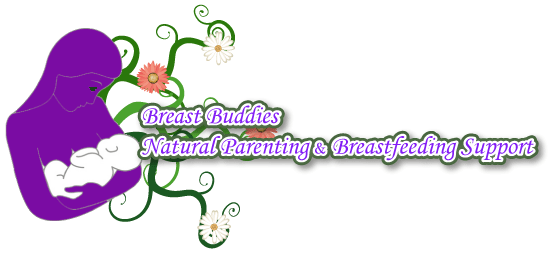Kelly mom information on ttc
Breast Buddies Natural Parenting And Breastfeeding Support Forum. Attachment Parenting :: TTC, Pregnancy and Birth :: Breastfeeding and trying to conceive
Page 1 of 1
 Kelly mom information on ttc
Kelly mom information on ttc
Katie (Badcop) has given me some great information on Breastfeeding and TTC, I hope you find it of some use.
http://www.kellymom.com/bf/normal/fertility.html#transition
The transition to full fertility
Several studies have indicated that fertility and ovarian activity return step by step (Ellison 1996, p. 326-327):
- Follicular activity without ovulation (No chance of pregnancy.)
1a. Menstruation without ovulation (This does not always occur--see below.) - Ovulation without luteal competence (After the egg is released, fertilization may take place. During the luteal phase, the uterine lining is prepared for implantation as the egg travels down the fallopian tube and into the uterus. If the uterine lining is not adequately prepared for implantation, the implantation will probably not be successful.)
- Full luteal competence (Full fertility -- at this point breastfeeding no longer has any effect on your chance of pregnancy.)
It is possible to have one or (occasionally) more periods before you start ovulating. In this case, menstruation begins during the first stage of the return to fertility --before ovulation returns. Cycles without ovulation are most common during the first six months postpartum. For other mothers, the first menstruation is preceded by ovulation - a longer period of lactational amenorrhea increases the likelihood that you will ovulate before that first period.
A very small percentage of women will become pregnant during their first postpartum ovulation, without having had a postpartum period. Per fertility researcher Alan S. McNeilly, this "is rare and in our experience is related to a rapid reduction in suckling input."
It is not uncommon for breastfeeding mothers to report cyclical cramping or PMS-type symptoms - symptoms of an oncoming period without the period - for weeks or even months before their period returns. When this happens, the body is probably "gearing up" for the return of menstruation, but breastfeeding is still delaying the return of fertility.
The amount of time that it takes for the transition to full fertility varies from woman to woman. In general, the earlier that your menses return, the more gradual the return to full fertility.
| Reference | Menstruation without ovulation | First ovulation without luteal competence | Time between 1st period and ovulation | ||
| 0-6 mo | after 6 mo | 0-6 mo | after 6 mo | ||
| Eslami 1990 | 67% | 22% | -- | 8.4 weeks | 0.1 week |
| Gray 1990 | 45.1% | "the rate fell greatly" | 41% | -- | -- |
| Reference | Frequency of ovulation | ||||
| Lactation: 1st cycle | Lactation: 2nd cycle | Post-weaning: 1st cycle | Post-weaning: 2nd cycle | Formula-feeding only: 2nd cycle | |
| Howie 1982 | 45% | 66% | 70% | 84% | 94% |
Probably not. If you are still transitioning to full fertility (as discussed above), breastfeeding may affect the success of implantation. Once implantation is successful, breastfeeding should not affect a healthy pregnancy (see A New Look at the Safety of Breastfeeding During Pregnancy for more information). If your periods have come back and settled into a regular pattern, it is likely that breastfeeding is no longer affecting your fertility.
Many moms can conceive without deliberately changing their toddler's nursing patterns. There is no "magic" threshold of breastfeeding that will allow you to conceive -- every mother is different. Some moms need to stretch out nursing frequency and/or shorten nursing sessions to make it easier to conceive -- babies naturally do this themselves as they get older, so one of your options is simply to wait a bit.
Changes that are more abrupt tend to bring fertility back faster (e.g., cutting out one nursing session abruptly, rather than gradually decreasing nursing time at that session) --even if you continue to breastfeed a great deal-- this is why many mothers experience the return of fertility when their child sleeps through the night or starts solid foods. If you decide to make changes to your nursing pattern, the time of day that you make the change (e.g., cutting out or shortening a nighttime nursing session as opposed to a daytime nursing session) should not make that much of a difference. Current research indicates that nursing frequency and total amount of time at the breast per 24 hours are the most important factors, rather than the time of day that the suckling occurs.
A few moms do find it impossible to conceive while nursing, but this is not at all common.
Many mothers wonder whether breastfeeding will affect the reliability of pregnancy tests. It does not -- pregnancy tests measure the amount of the hormone hCG (human chorionic gonadotropin) in blood or urine, and hCG levels are not affected by breastfeeding. The developing placenta begins releasing hCG upon implantation; a pregnancy can generally be detected with a pregnancy test within 7-14 days after implantation.
For more information, see Getting Pregnant While Breastfeeding by Hilary Flower.
When you do get pregnant while breastfeeding, what next? See Nursing During Pregnancy & Tandem Nursing for more information.
 Similar topics
Similar topics» Some information about ttc when bfing
» Useful information sources
» Useful information on breastfeeding a newborn
» Useful information sources
» Useful information on breastfeeding a newborn
Breast Buddies Natural Parenting And Breastfeeding Support Forum. Attachment Parenting :: TTC, Pregnancy and Birth :: Breastfeeding and trying to conceive
Page 1 of 1
Permissions in this forum:
You cannot reply to topics in this forum

